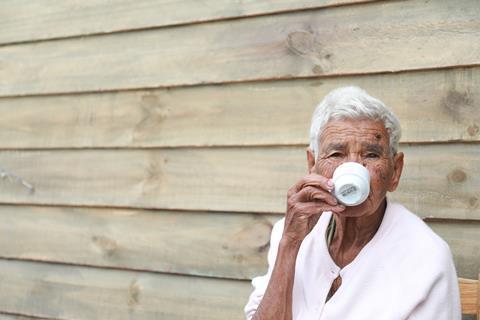It's difficult to know how to handle elderly relatives if they say something racist, here Cassandra Maria explains why it's important to speak up.

You know what they say: "You can’t choose your family." As much as they can be a source of joy, love and support, they can also pose some difficulties that we don’t quite know how to handle. One of those issues is racism.
Yep, we’re straight in at the deep end – what do we do if our family members are racist? And not just any family members, our grandparents? Of course racism is wrong and we should absolutely let people know when it’s being so disgustingly displayed that it’s not OK. But let’s be honest, with family it can feel very uncomfortable. It’s easy to say that we’d tell them they were wrong if they made a racist comment but in practice, is it as easy as it sounds? How do we do that, and should we?
Before we discuss calling out our grandparents on racist remarks, we need a little context. The elderly generation were bought up in a different time to us. When they were younger there were things society said were OK, but we would never dream of saying them now. That's not because it wasn't wrong then, but because we know more than we did. A lot of people think that the language, beliefs and prejudices that older people hold, should be left unchallenged. They think that we may as well leave them to pass along with the generation and that there’s no need to disrupt their peace at the end of their lives. Their perspective is: "Why does it matter when they’ll be gone soon?" But is that the best response, when the racism is happening in your own family?
In the past, I have challenged an elderly person on their views.
In the past, I have challenged elderly people on their views. I was in Wales and saw two elderly ladies selling golliwog dolls in their store. I didn't hesitate to tell them that these were racist. Even though they were over 80 years old, it didn't mean they were allowed to sell offensive items.
Being a mixed race woman, I have both black and white grandparents. My white grandparents have been very loving and they’ve never said anything racist to their grandchildren, but I’ve heard them refer to black people as "coloured" in passing and haven’t had the same boldness with them as I did with the strangers in Wales. Looking back on those few moments I do regret not saying something, or at least asking someone else to as I wasn’t that close to them at the time.
Read more on wellbeing
Am I a bad Christian if I have anxiety?
As difficult as it may be, correcting elderly grandparents is important because they may not be privy to societal norms today. It's easy for them to be detached from what’s OK to say and what isn’t, still living in the past and unwilling to budge. You may be their only source of correction and that means it’s your duty to educate them. I shudder to think what would happen if these same elderly loved ones were to say something out of turn in public in front of the wrong people. Imagine if I were the violent type and saw these two ladies selling golliwog dolls? They might’ve gotten more than a telling off from some young woman with a Brummie accent! We have a duty to protect our loved ones from unwittingly hurting someone and from getting hurt themselves in retaliation. Plus, we have a duty of care to protect those people on the receiving end of racism too. Having someone treat you differently because of the colour of your skin is terrible. They/we don’t always want to be the ones to educate strangers, nor should they/we be, so let it start at home. Afterall, Proverbs 27:17 says: "As iron sharpens iron, so one person sharpens another."
Afterall, Proverbs 27:17 says: "As iron sharpens iron, so one person sharpens another."
If you have a close relationship with your grandparents, one where you are comfortable around them and talk to them about an array of things, and they use a word like "coloured" then it would be easier to gently say to them: "Grandma, that’s not what people say anymore." If your grandparent is outright racist, then a more stern pull in the right direction would be required. If you have siblings or parents, try and do it together, letting the one closest to them lead the conversation.
When people hit a certain age, they’re often treated with "handle with care" gloves and this can be de-humanizing. I think it’s better to open these discussions and treat them like humans. It may be welcomed by them and give you all something new to talk about. So no, you can’t choose your family members, but you can absolutely choose whether you want to impart something valuable into their lives or not. No matter how old we get, we're never above learning.




































2 Readers' comments